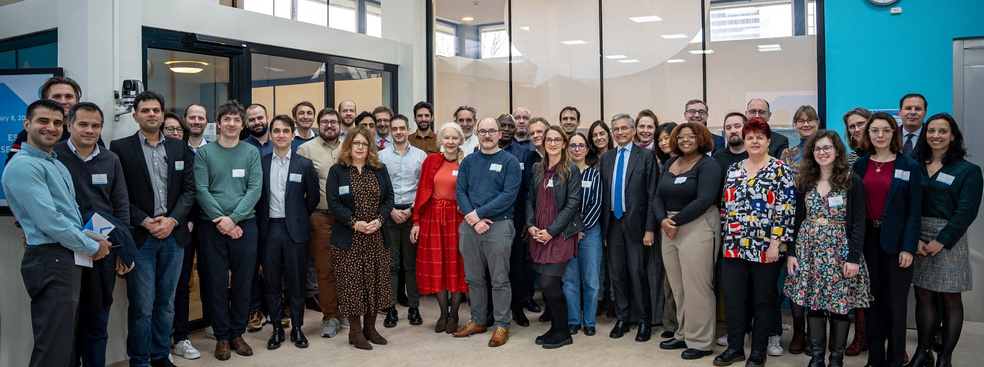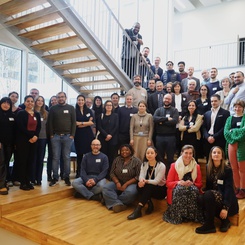ESSEC Business School is a thriving hub for cutting-edge research across multiple disciplines: our 152 professors conduct research in economics, finance, marketing, management, accounting and management control, operations management, information systems, statistics, decision sciences, and public and private policy. On February 8th, 2023, the ESSEC Research Center (CERESSEC) organized the second annual Research Day, a day-long conference dedicated to research excellence. ESSEC professors and invited guests from CY Cergy-Paris Université and Ecole normale supérieure shared their work with their peers, covering topics from leadership, to geopolitics, to machine learning, and much more. Roméo Tedongap, Director of Research, notes, “The day is a unique opportunity to learn more about the work of our colleagues, discuss research ideas, and brainstorm potential future collaborations and multidisciplinary projects.” Over the course of the day, there were academic presentations, a round-table discussion on the importance of scientific integrity, and a poster session showcasing the ongoing work of ESSEC PhD students.
Read on to get a glimpse of the exciting research on the go at ESSEC!
Academic presentations
After opening remarks from Michel Baroni, ESSEC Dean of Faculty, and Roméo Tedongap, ESSEC professors shared ongoing and published research projects in sessions moderated by ESSEC professors Karoline Strauss (Management), Amir Sepehri (Marketing), Patricia Charléty (Economics), Ha Hoang (Management), Elisa Operti (Management), and Maciej Workiewicz (Management
Undestanding Catastrophic Forgetting in Machine Learning
Pierre Alquier, Professor of Information Systems, Decision Sciences and Statistics (ESSE
Continual learning is a setting in which an agent has to learn from an incoming stream of data during its entire lifetime. Although major advances have been made in the field, one recurring problem which remains unsolved is that of "catastrophic forgetting": by updating its knowledge while solving new tasks, the agent tends to forget information that was correctly inferred from past data during the previous tasks. We will first provide a general introduction to continual learning and its applications. We will then discuss the first attempts to understand catastrophic forgetting from a statistical perspective. Such a theory is still incomplete, but it already provides hints on how to mitigate forgetting. More precisely, we introduce a mathematical measure of the similarity between various tasks the agent has to solve, called the Neural Tangent Kernel (NTK) overlap matrix. Analyzing the NTK overlap matrix of standard learning algorithms suggests practical modifications of these algorithms that partially avoid forgetting.
Challenging Gender Studies and Related Movements
Laurent Bibard, Professor of Management (ESSEC
Since the beginning of the Ukrainian war, it’s been clear that the Russian side makes the LGBTQIA+ movements an instrument of its politics: they cast Western culture as a decadent civilization, making room for any kind of sexual orientation to what they deem the detriment of heterosexual relationships and related traditions. We – the Western side – should not ignore this kind of argument, for it highlights the political background of gender studies. This political background is made of the historical emergence of the notions of freedom and equality. Forgetting about this emergent phenomenon would make us unable to grasp the real place and role of gender studies, and to really resist the current attempt to destroy what has been conquered during centuries. In other words, in order to strengthen their action, practically and theoretically at once, gender studies and related movements should never forget about the conditions which made them possible, including the political ones. The tensions related to this issue in the context of the current competition between the two candidates for the US Presidency make the stakes clear.
Recent Advances On The Economics And Management Of Environment
Fouad El Ouardighi, Professor, Department of Operations Management (ESSEC)
Dr. Ouardighi discussed five important topics related to pollution control in economics and management science that have been the subject of recent scientific advances, namely i) modeling environmental absorption efficiency, ii) the problem of non-cooperative pollution control strategies, iii) the issue of dynamic inconsistency, iv) the search for a unified model of pollution control and deforestation, and v) the integration of pollution control and the exploitation of renewable natural resources. Due to inefficiencies associated with static models, the focus is only on dynamic pollution control models.
Remedies for Growing Pains: How Venture Leaders Manage Stalemates When Scaling Senior Executive Teams
Sam Garg, Associate Professor of Management, ESSEC
We investigate how venture leaders can effectively manage stalemate conflicts that arise after hiring senior professional executives. Using a multi-case study inductive method, we analyze 21 top management team (TMT) stalemates – i.e., paralyzing communication breakdowns between task-dependent parties – within four Hong Kong fintech ventures that raised venture capital. Our study contributes to the venture professionalization/ scaling literature in several ways. We introduce negative intra-TMT dynamics into the literature by identifying stalemates that emerge during the professionalization process and classifying these stalemates as horizontal or vertical. Importantly, we develop a contingency framework that consists of four actions taken by the venture leaders to manage these stalemates. Our framework reveals that “private mediation” is effective in managing horizontal stalemates and “structural crafting” is effective in managing vertical stalemates. Interestingly, what is effective for horizontal stalemates is ineffective for vertical stalemates. Further, we find “open discussion” and decision enforcement by the venture leaders – two actions suggested in prior conflict management literature – to be ineffective for all types of stalemates in our data. Beyond venture professionalization, we offer a fresh lens on conflict management as brokering by highlighting the space and hierarchy in the brokering process.
A Greenwashing Index
Elise Gourier, Associate Professor of Finance (ESSEC)
We construct a news-implied index of greenwashing. Our index reveals that greenwashing has become particularly prominent in the past five years. Its increase was driven by skepticism towards the financial sector, specifically ESG funds, ESG ratings and green bonds. We show that greenwashing impacts investors' behavior and estimated required premium for climate risk. Unexpected increases in the greenwashing index tend to be followed by decreased flows into funds advertised as sustainable. They furthermore bias the estimation of stocks' beta on climate risk, distorting the estimated climate risk premium. When accounting for greenwashing, the climate risk premium becomes small and statistically insignificant.
Sampling Probability Distributions on Constrained Spaces
Pierre Jacob, Professor of Information Systems, Decision Sciences and Statistics (ESSEC)
Dr. Jacob explained the problem of sampling probability distributions and its relevance in statistics, and then presented some on-going work on the design of algorithms to compute probabilities supported on constrained spaces, for example all the real vectors with a fixed norm, a fixed sum, a fixed product, etc. These strange distributions arise increasingly often, in hypothesis testing, Bayesian inference and other fields.
Denoising Over Network With Application to Partially Observed Epidemics
Olga Klopp, Associate Professor of Information Systems, Decision Sciences and Statistics (ESSEC)
We introduce a novel approach to predict epidemic spread over networks using total variation (TV) denoising, a signal processing technique. We show how application of 1-bit total variation denoiser improves the prediction accuracy of virus spread dynamics on networks especially in the challenging setting of incomplete data.
Sanctions Against Russia: Can We, and Should We, Go From Freezing to Seizing Russian Assets?
Veronika Korom, Assistant Professor of Public & Private Policy (ESSEC)
Economic sanctions involve the suspension of customary trade and financial ties for foreign policy and security reasons. They aim to inflict economic pressure, prompting changes in policies by the target state or non-state actors. Situated between diplomacy and warfare, sanctions have gained popularity as a foreign policy tool over recent decades.
In response to Russia's invasion of Ukraine in February 2022, the European Union (EU) significantly expanded its sanctions against Russia, building upon those imposed in 2014 following the annexation of Crimea. These measures, among others, froze approximately €20 billion in privately held Russian assets and an additional €200 billion from the Russian Central Bank within the EU.
As the conflict persists, pressure is growing to confiscate and utilize the frozen Russian assets in the EU to assist Ukraine in financing its war efforts and reconstruction. In response to this pressure, the EU has introduced several proposals regarding the possible confiscation of the frozen Russian assets.
This presentation will offer a concise analysis of the EU proposals and delve into the potential legal hurdles arising from EU and international law, encompassing aspects like property rights, due process, and State immunity, should the current EU proposals be put into action. Furthermore, it will examine the expected legal repercussions and consider the potential political and financial implications, which should be taken into account when considering whether we can and should transition from freezing Russian assets to seizing them.
Does Banning Radical Users Make Them Any Better? An Analysis of the Impact of the 2021 Twitter User Bans on User Behavior Post Re-admission
Raoul Kubler, Associate Professor of Marketing, ESSEC Business School
The perception of social media and the internet has drastically shifted. Initially hailed as tools for liberation, social media is now widely perceived as a potential threat to democracy. This change is attributed to the rampant spread of hate speech and disinformation. To combat this, platforms primarily use banning policies to enforce user terms. This study leverages the events surrounding the 2021 US Capitol Riots and the 2022 re-admissions of previously banned users by Elon Musk. Our study analyzes pre- and post-ban behavior of more than 10,000 Twitter users to understand the impact of bans and re-admissions on user behavior. We show that Twitter mostly re-admitted larger and older accounts with high pre-ban engagement rates, largely ignoring previous hate speech usage and disinformation spreading. Our results indicate that 50% of users do not significantly change their behavior post-ban, while 35% show a significant decrease in violations. More worrisome, we also find that 15% of re-admitted users become more radical after re-admission. We subsequently develop a predictive model that helps platform operators to identify individuals who positively react to a ban, and that will screen out users, who will not change their negative behavior or become even more radicalized. The findings will contribute to the ongoing discourse on balancing free speech with the responsibility to curb hate speech and disinformation on social media platforms.
Migration, Social Change, and the Early Decline in the United States Fertility Rate
Stefania Marcassa, Associate Professor (CY Cergy Paris University)
Our study examines the impact of internal migration on the fertility transition in the 19th-century United States. We find evidence that fertility declined at a faster rate in counties experiencing higher rates of outward migration, particularly toward the western frontier. To estimate the causal effect of migration on fertility decline, we leverage the number of acres granted to American war veterans by Congress between 1847 and 1855. Our research explores the propagation of novel family values that influence intergenerational behaviors concerning savings and fertility. Migration, coupled with limited remittance technology, prompted parents to engage in precautionary savings. This phenomenon fostered the decline of the multigenerational family structure rooted in an agricultural economy
Play and Psychological Safety: Insights into Innovative Work
Anca Metiu, Professor of Management (ESSEC)
Based on ethnographic field research in a high-tech firm, we develop a process study of the complex and highly recursive relationship between play and the psychological safety that is key to innovation. Through our focus on play episodes, we identify several distinct play practices: generalized initiation of play, amplifying play, diffusion of play, and engagement in demonstrative behavior. We show how these practices generate psychological safety via two mechanisms: vulnerability and comradeship. Psychological safety is both a result and a reinforcer of play practices. Once established, psychological safety fosters several work processes on which innovation rests, namely engendering new ideas, finding collaborators, intensifying effort, and addressing difficult conversations and conflict. By articulating the mechanisms and feedback loops connecting play practices with psychological safety, our inductive model advances the understanding of the conditions that enable innovation in contemporary organizations.
From Climate Shocks to Firm Productivity, Demand and Markups in a (de-) Globalized World
Giordano Mion, Professor of Economics (ESSEC)
In a fast-evolving global context of polycrisis, understanding the impact of physical climate change on the economy can bolster the economic response and design of policies aimed at supporting the adaptation efforts. This is combined with a geopolitical context, in the wake of COVID-19, that encourages greater self-sufficiency and fosters supply chain resilience. This project aims to bring together several approaches from the economics literature to improve the understanding of how climate shocks and their frequency affect different firm-level margins e.g., productivity, output and markups. In addition, it will explore whether these effects have increased with economic uncertainty in a post-COVID age of slowbalization/de-globalization. We will use data on past weather to then construct exogenous (to the Belgian economy) agricultural price shocks. We will then combine the Business to Business data (allowing to observe the network of firm transactions within Belgium and so the propagation of price shocks) with the Prodcom data (allowing to observe quantities produced and prices of detailed manufacturing products), as well as more standard balance sheet and international trade data, over a recent period of time (2012-2022). This will allow us to obtain measures of productivity, demand and markups while paying attention to both the cross-sectional and dynamic features of the data and exploring relevant issues like the propagation of agricultural price shocks, multi-product firms, servitization of manufacturing firms and ownership links.
Accounting Numbers as Weapons: A Study of Repertoires in the Battle for Shareholders’ Votes
Chrystelle Richard, Associate Professor, Department of Accounting and Management Control (ESSEC)
Activist hedge funds are becoming a major disruptive force in capitalism that contributes to fracture the traditional inner circle of the corporate elite by imposing new narratives to shareholders. Our study aims to better understand how this is done and how corporate elites confront such threats by examining the repertoires of contention used by an activist hedge fund and a corporate board during the struggle for the control of a large Canadian company. Theoretically, this study introduces the notion of repertoire of contention to capture the differences in narratives during struggles over corporate control. This complements existing approaches which focused on the immediate strategic interactions between actors involved in discursive challenges to account for the role of hysteresis, which depends on the past position of actors, path dependence, which depends on the choices made during the discursive struggle, in how actors develop their narratives. Our study also accounts for the reactions of shareholders and different stakeholders to different repertoires and how this contributes to challenging established corporate elites, contributing to research on the evolution of financial capitalism.
0DTE Options
Roberto Reno, Professor of Information Systems, Decision Sciences and Statistics, (ESSEC)
The market for ultra short-tenor (zero days-to-expiry or 0DTE) options has grown exponentially over the last few years. In 2023, daily volume in 0DTEs reached over 45% of overall daily option volume. After briefly describing this exploding new market, we present a novel pricing formula designed to capture the shape of the 0DTE implied volatility surface. Pricing hinges on an Edgeworth-like expansion of the conditional characteristic function of the continuous portion of the underlying price process. The expansion shifts probability mass from an otherwise locally Gaussian return density by adding time-varying skewness (through leverage) and time-varying kurtosis (through the volatility-of-volatility). The expansion is local in time and, therefore, naturally suited to price ultra short-tenor instruments, like 0DTEs. We document considerable (1) price and (2) hedging improvements as compared to state-of-the-art specifications. We conclude by providing suggestive results on nearly instantaneous predictability by estimating 0DTE-based return/variance risk premia.
All-Weather Hedging, Reshoring Decision Making, And Integrated Risk Management
Andrea Roncoroni, Professor, Department of Finance (ESSEC)
Corporate risk may dramatically change after severe market shocks (say a pandemic, a geopolitical turmoil, or an extreme weather event). This change may undermine the effectiveness of standing hedging policies and drain liquidity to perform the required policy adjustments. We propose a criterion to design the most conservative hedge over an appropriate dimension of model uncertainty, say the supply chain reliability. Our theory is first developed within a stylized newsvendor model featuring an unreliable supplier. Next, concepts and heuristics are applied to a more realistic model of production off/re-shoring. We highlight benefits and costs related to an all-weather approach and demonstrate the related time saving effects.
The Monetary Entanglement Between CBDC and Central Bank Policies
Luciano Somoza, Assistant Professor, Department of Finance (ESSEC)
Using a two-period equilibrium model, we show that the effects of introducing a Central Bank Digital Currency (CBDC) depend on the ongoing monetary policy. We derive neutrality conditions without direct pass-through policies and find that they do not always hold with quantitative easing, as bank lending shrinks if demand for CBDC is above a certain threshold. Moreover, we find that commercial banks optimally liquidate excess reserves in the system to accommodate households’ demand for CBDC. This leads to the replacement of banks with households on the liability side of the central bank balance sheet, making quantitative tightening difficult to implement.
Consumption Motives and the Endorsement of Market Norms
Camilla Zallot, Assistant Professor, Department of Marketing (ESSEC)
Economic notions suggest that higher willingness to pay (WTPs) reflect stronger preferences, and that selling to the highest bidder is the most efficient way to allocate goods. Consumer research, however, has identified a range of situations under which people do not endorse these notions. We add to this stream of research by investigating the effect of consumption motives (functional, hedonic or symbolic) on the extent to which people consider WTP an appropriate way to sort preferences and to allocate goods. In four studies so far, we demonstrate that while functional and hedonic motives correlate positively, symbolic motives correlate negatively with the perceived appropriateness of allocating through a market and with the preference for a market over random allocation (Study 1).
In Study 2a, we manipulate consumption motive between-subjects and show that participants are less likely to endorse selling to the highest bidder (vs a random allocation) when it is symbolic. In Study 2b, we show that the same effect is mediated by perceived motive ‘meaningfulness’ and not by perceived need or preference strength. In Study 3, we show that perceived motive meaningfulness increases the extent to which sellers are willing to reduce their WTA for a hypothetical sale, despite their predictions that the buyer’s WTP does not change or increase as meaningfulness increases.
A roundtable on the importance of scientific integrity
Any discussion of research also needs to take ethics into account. The day also featured a roundtable on scientific integrity, chaired by Radu Vranceanu, Professor of Economics at ESSEC and the ESSEC Referent for Research Integrity (RIS). He moderated a discussion with Roméo Tédongap, Luciana Radut-Gaghi (Vice-President of International Relations and Strategic Partnerships, CY Cergy Paris Université), Laurent Bach (Associate Professor of Finance, ESSEC) and Xavier Lambin (Assistant Professor of Economics, ESSEC).









